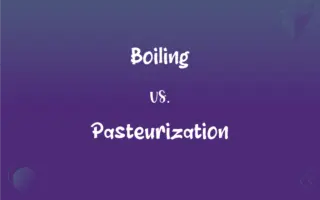Will vs. Will Be: What's the Difference?
Edited by Aimie Carlson || By Harlon Moss || Published on December 1, 2023
"Will" expresses determination, intention, or future action, while "will be" specifically denotes a future state or condition.

Key Differences
"Will" is used to indicate a future action or a willingness to perform an action. "Will be" is used to describe a future state or condition of being, focusing more on existence than action.
In usage, "will" can express promise, offer, or decision made at the moment of speaking. In contrast, "will be" is typically used to describe a state that is expected to exist in the future.
"Will" often precedes a verb, giving it a future tense. "Will be" is followed by a noun or adjective, indicating the future state of the subject.
The use of "will" is more versatile, applicable in various contexts, including requests. "Will be" is more specific, usually indicating a change that is anticipated to happen.
"Will" can imply intention or decision, reflecting the subject's control over the action. "Will be" suggests inevitability or certainty about a future condition, often beyond the subject's immediate control.
ADVERTISEMENT
Comparison Chart
Usage
Indicates future action or intention
Describes a future state or condition
Context
Used for promises, offers, or decisions
Used for expected future states or changes
Grammar Structure
Follows with a verb
Followed by a noun or adjective
Flexibility
Versatile in various contexts
Specific to indicating future changes
Implication
Suggests intention or decision
Suggests inevitability or certainty
ADVERTISEMENT
Will and Will Be Definitions
Will
Expresses future actions or events.
I will call you tomorrow.
Will Be
Describes a future state or condition.
The weather will be sunny tomorrow.
Will
Used for making promises or offers.
I will help you with your project.
Will Be
Suggests inevitability or certainty.
The concert will be crowded.
Will
Indicates intention or decision.
She will start her new job next week.
Will Be
Used to predict future occurrences.
Prices will be higher next year.
Will
Shows willingness or consent.
He will lend you the book.
Will Be
Indicates a change expected to happen.
The meeting will be held at 9 AM.
Will
Can denote a habitual action.
They will go for a walk every evening.
Will Be
Can describe future roles or positions.
She will be the team leader.
Will
The mental faculty by which one deliberately chooses or decides upon a course of action
Championed freedom of will against a doctrine of predetermination.
Will
Diligent purposefulness; determination
An athlete with the will to win.
FAQs
Is "will" used for intentions?
Yes, it shows intention or decision about future actions.
Can "will" express a promise?
Yes, it's often used for promises or offers.
How is "will be" different?
It describes future states or conditions.
What does "will" signify?
It indicates future actions or decisions.
How does "will" work in a sentence?
It precedes a verb, giving it a future tense.
Can "will be" suggest roles?
Yes, it can describe future roles or positions.
Is "will be" versatile in usage?
It's more specific compared to the versatile "will."
What does "will be" imply about the future?
It suggests certainty or inevitability of future states.
Can "will" denote willingness?
Yes, it can show willingness or consent.
Is "will" only for future actions?
Primarily, but it can also indicate habitual actions.
Does "will be" follow a specific structure?
It is usually followed by a noun or adjective.
In what context is "will be" used?
Often in contexts predicting future occurrences or changes.
What kind of future events does "will be" predict?
It predicts future states, roles, or conditions.
Is "will be" used in predictions about weather?
Yes, it's often used for weather predictions.
Do both "will" and "will be" indicate certainty?
Yes, both suggest certainty about future events or states.
How is "will" used in requests?
It can be used to make polite requests or offers.
Does "will be" have different forms?
No, it remains consistent regardless of the subject.
Can "will" be used in conditional sentences?
Yes, it's commonly used in conditional clauses.
How does "will" express habitual actions?
By indicating a routine or habitual future action.
Does "will be" imply control over the future?
It often suggests inevitability rather than control.
About Author
Written by
Harlon MossHarlon is a seasoned quality moderator and accomplished content writer for Difference Wiki. An alumnus of the prestigious University of California, he earned his degree in Computer Science. Leveraging his academic background, Harlon brings a meticulous and informed perspective to his work, ensuring content accuracy and excellence.
Edited by
Aimie CarlsonAimie Carlson, holding a master's degree in English literature, is a fervent English language enthusiast. She lends her writing talents to Difference Wiki, a prominent website that specializes in comparisons, offering readers insightful analyses that both captivate and inform.































































